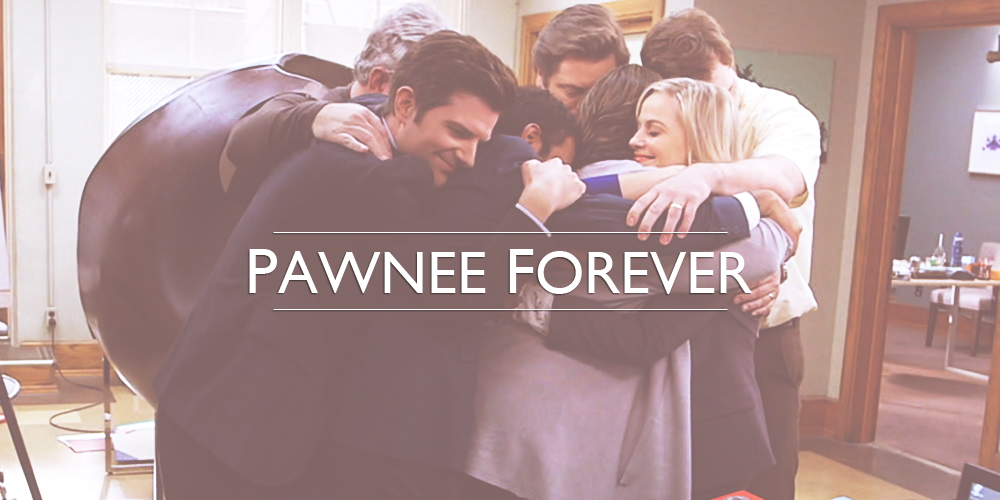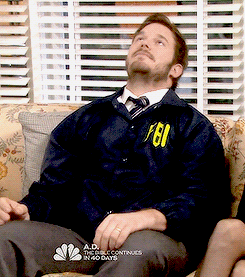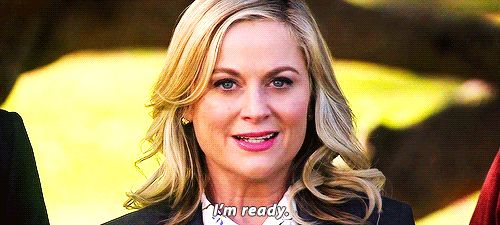
Last night was the series finale of Parks and Recreation.
I sobbed.
I didn’t start watching the show when it first aired. It was already into its third season when my boyfriend Elliot first got into it and was into its fourth by the time he convinced me to sit down and really watch it with him. Since then, I’ve seen every episode*, via some combination of Netflix, Hulu, DVD and, in the last few months, reruns on the Esquire Network, some of them many times over. The show’s seventh season was the first one that I actually saw as it aired.
Watching Parks and Rec is a thing that happens a lot in our home: if there’s nothing on TV, or nothing else going on, or if it’s just been a stressful day and we want something to chill out with, Netflix is likely to get booted up and an episode of the show put on.
Parks and Recreation had the biggest heart of any show on TV, without ever being maudlin or melodramatic. Never mean or ironic or bitter, it was a show about people who liked each other working together to make their town a better place. It was also probably the best comedy on the air for most of its seven seasons.
I kind of wish I hand’t started this blog just a few days before the show ended, so that I could have had more time to write about the show while it was on the air. Condensing all of my thoughts on the show into one blog post is going to be impossible. In fact, in writing what was supposed to be a blog post on the final episode, “One Last Ride,” I realized I had written about nearly 1000 words without actually saying much about the finale. So, this post is going to be the first of a couple dealing with the end of Parks and Rec and what made it so rewarding.
Spoilers follow, for those who haven’t watched the finale yet.
One of the most impressive things about Parks and Recreation throughout its run, and one of the things that I think helped make it successful, was its willingness to make big changes in the lives of the characters. Lots of sitcoms find a formula that works and milk it for laughs for as long as they can – the genre is situation comedy, and if you’ve got a situation that’s funny, why not keep going back to that well?
The answer is, eventually the well runs dry and the jokes stop being funny. Plus, if your characters’ situations aren’t changing, that means your characters aren’t growing and there are no long-term emotional stakes, and if there are no long-term emotional stakes, there’s nothing to anchor the show when you scramble to change the formula after the jokes run dry.
This is where Parks and Rec excelled – it never relied on a formula, and instead, constantly changed the situation for its characters. Few comedies have as successfully reflected the everyday cataclysms that mark the passage of time without cheaply sacrificing story or character. And, in a way, I think the show’s mediocre ratings (by NBC standards) were actually a boon to the show’s creative team, allowing them to have the show respond to its own story rather than have the story driven by external forces, whether it be the pressures of sustaining a hit, or the flat panic of knowing the plug could be pulled if you don’t do something drastic.
Just to take one example: the show’s three big onscreen weddings – April and Andy, Leslie and Ben, Ron and Diane – were the opposite of TV event weddings. Instead, they were moments born out of the characters behaving the way the audience knows these characters behave, reacting to what was going on around them. And they were so much more sweet and touching and rewarding for it.

I mean, come on.
The same could be said for any of the big changes on the show: Ann’s joining the Health Department, Tom’s various business ventures, Ben’s move to DC, Andy’s move to London, Leslie’s campaign, election, and recall, or the show leaping forward in time 3 years. They changed the characters’ situations, but never changed who these characters fundamentally are to one another.
The effect made the characters and their relationships feel real, because that’s how life is: people grow up, we get married, we move away from our hometowns, we get promotions, we quit our jobs, we take on new responsibilities, we suffer disappointment.
The constants, through all this change, are our values and the people we love.
That, ultimately, was Parks and Rec. It was a show about people who loved one another doing things together. Even as their situations change, these people still love each other and working with one another. Or, as Leslie put it in her commencement speech, and what essentially served as the show’s most clear statement of its theme: “What makes work worth doing is getting to do it with people you love.”
Now, to say that the characters were the show’s constant isn’t to say the characters themselves didn’t change at all. In fact, part of what makes watching the show through its full run rewarding is seeing how the characters change and grow in response to the changes in their lives. But who they are at their core remains the same.
Take Chris Pratt’s Andy as perhaps the most drastic example. He starts the show as this borderline-unlikable lazy bro, and by the finale, he’s a successful entertainer eager to start a family. Now, Andy’s growth got something of a jumpstart with the show’s sophomore year recalibration, as the show realized what it had on its hands with adorable-human-adult-with-the-personality-of-a-golden-retriever-puppy Chris Pratt. But even Season 2’s torch-carrying pit-dweller was miles away from biological-clock-ticking grownup of “One Last Ride.” But, we see how he gets there. Largely unremarked upon at the end of Season 6 is the fact that Andy is basically managing the Unity Concert. It would be hard to imagine Leslie trusting him with something like that before, but we’ve seen him grow into someone who not only can do something like that, but wants to. Seeing Andy’s growth is part of why it’s so sweet that one of the five parts of every episode of his “Johnny Karate Super Awesome Musical Explosion Show” is to “try something new that used to scare you.” Andy, despite being a total goofball, is a rich, fully-realized person. That’s why this paragraph uses so many hyphens in describing him.

Andy Dwyer is vast, he contains multitudes.
In fact, its when the show fails in showing us this growth that are some of its weaker moments. Tom falling back into his old habits trying to open Tom’s Bistro late in Season 6 is never quite as funny as it’s expected to be, and seeing him ignore Ben’s financial advice and fall into the thrall of the pursuit of glamour and swag seem like a step back for him. It’s a small thing, but in a show that generally handles character growth so well, it stands out. (Fortunately, this gets somewhat addressed in the finale. God, remember when this blog post was going to be about the finale?)
Not only did the characters and their relationships change, but so did Pawnee itself. I’m not talking about the elastic reality of the show’s world, in which a medium-sized town city council district race involves TV ads, a campaign bus, and daily tracking polls. I mean the issues that confronted the city tracked with issues many American cities were faced with during the show’s run. Who would have thought that a show that in its early seasons had a city grappling with financial crises and government closures would have ended dealing with gentrification and an influx of young tech money?
Besides just a way for the show to deal with issues in the headlines, Pawnee’s recovery from near collapse is an important part of the show’s central character’s story in its final season. Leslie’s love of Pawnee is a big part of the show. She literally wrote the book on Pawnee (and you can actually buy it, and I have, as a gift to Elliot, and it is one of the best pieces of promotional tie-in material ever). The fact that Pawnee is no longer a city in crisis, and that Leslie is largely responsible for making that happen, make it easier for the girl who is so completely in love with the city to let go of it and start reaching her full potential.
And this brings me to why the finale was so rewarding. In a show where the constant was the characters and their relationships, the finale – and really the whole final season – was about reminding us that sometimes these changes in our lives are bigger than some of our relationships can handle. At some point, the sum total of all of those changes in our situations is going to mean that the story about our shared experiences, for all intents and purposes, has come to an end. But it also reminded us that that, too, can be okay, and that saying goodbye doesn’t mean losing everything you’ve built together.
Sometimes, we have to do something new that we used to be afraid of.

And I’m crying again.
Coming up in Part 2, how the finale pays off all of this work.